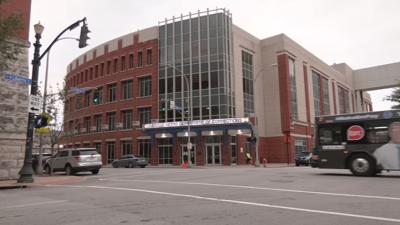LOUISVILLE, Ky. (WDRB) -- Potentially thousands of people can now be included in a lawsuit claiming they were improperly detained at Louisville Metro Corrections after they were supposed to be released.
A Nov. 24 ruling by a Sixth Circuit Court of Appeals affirms class action status to a suit filed in 2017 by former jail inmates.
It applies to anyone since February 2016 who was held at least four hours after serving out a jail sentence and those who were detained at least 12 hours after being ordered released by a judge after making bond or qualifying for home incarceration, among other reasons.
The suit claims Metro Corrections has for years wrongly detained thousands of inmates a day or longer — some for weeks or even months — after they were supposed to be let out, and the problem was all but ignored by top jail officials. In one instance, jail employee errors kept one person in custody for five months in 2016 and 2017 after his sentence was completed.
The ruling could end up costing Metro government millions of dollars, said Jim Ballinger, an attorney who represents the former inmates. He noted similar lawsuits in other cities have settled for multiple millions.
In 2001, for example, Los Angeles paid $27 million to settle class-action lawsuits on behalf of hundreds of inmates held in jail after courts ordered them released. As part of a $6 million settlement in Washington D.C. in 2013, the city agreed to pay $475,000 to improve inmate processing at the jail.
“There are thousands and thousands of people that sat over there (in Metro Correction) for days ... when they should have been released,” Ballinger said in an interview Tuesday, noting that the suit is ongoing, meaning anyone held too long in jail from 2016 until the case is settled can be included.
“The longer it goes on, the more it’s going to cost,” he said. “It would be wise for the city to go ahead and get this resolved ... because the problem is still happening.”
The city does not typically comment on pending litigation. The Jefferson County Attorney’s office, which represents the city in legal matters, did not immediately respond when asked whether the recent ruling will be challenged.
Metro Corrections spokesman Steve Durham has previously said the jail could not discuss this case.
But Louisville Metro Council President David James said Tuesday that he was concerned the lawsuit “could have a significant financial impact on the city.”
The city had asked the Sixth Circuit to deny class-action status for the lawsuit. But in a unanimous 3-0 decision, the Sixth Circuit upheld a lower court ruling, allowing the suit to proceed as a class action case.
U.S. District Judge Rebecca Grady Jennings, whose role was limited to determining whether the case had class action arguments, ruled Jan. 15 that the plaintiffs had demonstrated the jail's “failure to implement and maintain an adequate process for timely releasing inmates.”
Also, she ruled the jail does not track why inmates are improperly held and had known about the problem for years but failed to correct it.
Previously, U.S. District Court Judge David Hale, in declining to dismiss the case, said the allegations present a “troubling practice” in which the jail has “systematically failed to comply with state orders pertaining to individuals’ release dates.”
The suit alleges that retired Metro Corrections Director Mark Bolton and the man who replaced him — Bolton's longtime deputy, Dwayne Clark — have known since at least 2012 that problems in the jail’s records department were causing people to be jailed illegally but have done little about it.
Ballinger described Bolton and Clark as having a “laissez faire” attitude about the issue.
Clark, who oversaw the records unit, had no policy that late releases be reported or explained to him, for example, attorneys said in court records.
Bolton has said that while he couldn’t talk about specifics of the lawsuit, the courts were the main source of the problems being created.
But a city audit showed only about 7% of the release problems came from problematic court orders.
The cause of the problems, according to a 2017 letter from an FOP representative to a judge, is inadequate staffing and training, as well as outdated procedures and equipment.
Copyright 2021 WDRB Media. All Rights Reserved.











